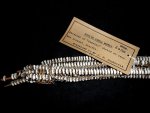Clarity,
Office 17622,
PO Box 6945,
London.
W1A 6US
United Kingdom
Phone/ Voicemail:
+44 (0)20 3287 3053 (UK)
+1 (561) 459-4758 (US).

HBs book offers the convention of Xs and O in the middle of a line. I have a bone to pick with that one too since the one that goes in the middle of the broken line can hide whether it is broken or solid (probably due to not remembering if it is supposed to be an X or O).
You don't need to physically throw coins or physically write down open and closed/broken and solid lines to make a serious cast. Not sure what a serious vs not serious cast is nor why one should be executed any differently.
I've always used what I was originally taught, namely an X in the middle of a 9 line and a 0 in the middle of a 6 line.
It really makes no difference how you designate the symbol of the received changing line in a manner that is clear to you, same as which side of a coin is yang or yin, or whatever you choose to call them. All that matters is that you transfer the idea clearly in your head and that it remains consistent so there's no confusion.
A serious casting is one in which the diviner is involved at psychological depth. If the casting does not involve the roots of your existence, it is not serious.

When no pen and paper is available when I'm needing to consult the I Ching I keep track of the change lines using my fingers.
I wonder if men's access to writing and writing tools over the last 500 thousand years has to some degree reduced their reliance on their inner knowingness/past life memories while woman have up until the last couple of hundred years for the most part had considerably less access to writing tools - and therefore have maintained a stronger reliance on the inner knowing which accounts for the wide acknowledgement of the "woman's intuition" phenomenon.
Even at Clarity, note Lisa's superiority in computer technology.
 ...but there are all kinds of things wrong with that conclusion. First off, I factually do not know very much about technology. I have a long-standing interest in computers, and in a hodge-podgey manner I enjoy reading things about them and related subjects, but I actually own only one second-hand laptop (about which I recently panicked when it turned out to need a new CMOS battery - not an indication of knowledge
...but there are all kinds of things wrong with that conclusion. First off, I factually do not know very much about technology. I have a long-standing interest in computers, and in a hodge-podgey manner I enjoy reading things about them and related subjects, but I actually own only one second-hand laptop (about which I recently panicked when it turned out to need a new CMOS battery - not an indication of knowledge Clarity,
Office 17622,
PO Box 6945,
London.
W1A 6US
United Kingdom
Phone/ Voicemail:
+44 (0)20 3287 3053 (UK)
+1 (561) 459-4758 (US).